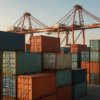

The responsibility falls on the truck driver to ensure that each truckload of goods arrives at its destination safely and intact. But accidents do happen; misfortune can strike even the most responsible operators. In the event that a customer’s property is damaged under your authority while in transit, motor truck cargo insurance is designed to cover the resulting liabilities.
No driver should haul without proper cargo coverage. Thankfully, these policies are simple to set up and a variety of options are available. However, just because your insurance broker secures a couple of decent quotes doesn’t mean your homework is finished. The next step is to double-check the policy for cargo exclusions and other factors. Time and time again, truckers learn far too late that their cargo was actually ineligible to receive coverage.
Cargo exclusions are just a few of the factors that policyholders should review before signing any insurance arrangement. Failing to do your due diligence can lead to costly consequences.
“One of the biggest mistakes that customers can make when buying cargo insurance is agreeing to what the broker provides and not asking for the additional details of the policy,” said Brandon Richards, Reliance Partners’ chief sales officer. “Insureds should always ask for a list of the policy exclusions that go along with that quote so they can see exactly what’s excluded.”
Richards further explained that broadly written quotes are typically what customers are presented; these one-page reports don’t necessarily mention the specifics of the policy such as its exclusions. One of the most common dry goods exclusions is electronics, much to the surprise of many truckers.
“Make sure that the items excluded aren’t ones that you’re hauling,” Richards said. “I can’t tell you how many times I’ve looked at a customer’s policy to find that one of their main contracts, whether it be electronics, seafood or pharmaceuticals, is listed as specifically excluded from their cargo policy.”
Zach Bowling, AmWINS Group senior vice president and an experienced broker for physical damage and cargo, explained the importance of informing your insurance provider of the commodities you plan to haul. “It’s always best to check; we never want to assume,” he said.
There are many different types of cargo policies on the market, which is why it’s important to know which one will best suit your business. Richards first asks his clients whether they understand the type of coverage they have and if they know for sure that it covers the exposure risks that are most pertinent to their operations.

Policies such as carrier’s legal liability and all-risk or shipper’s interest are considered “broad form” coverages as they cover a broader range of cargo commodities and liabilities. Richards added that broad form typically covers a lot more perils aside from any exclusions stated in the policy. Bowling further explained that specified or named-peril policies only cover a specific set of perils such as fire, lightning and traffic collisions, unlike broad form that covers everything unless specifically excluded.
Bowling added that the needs of each trucking company are different, meaning there’s a right coverage form for each insured on the road.
“If you’re running a smaller operation hauling only specific types of commodities on a dedicated route, then you really don’t need a third-party logistics type form. You’ll only need basic coverage from points A to B and occasionally to C,” Bowling said.
Richards also advises his clients to carefully review the exposure data for which your cargo will be quoted. Loads can be calculated on either a per-unit basis or determined by annual revenue. Be mindful that revenue policies are subject to audits; Richards warns that you could end up paying more than you expected if an underlying exposure isn’t represented correctly.
Policyholders should also ask their brokers or insurance agents about tacking on additional coverages to their policies such as options to cover broken seals, spoilage, towing limits or errors and omissions. Richards elaborated that standard policy forms typically don’t provide these options; however, they are items that can be purchased for an additional premium or can be built into the policy by the underwriter.
Before pouncing on any policy, Richards urges trucking companies and drivers to review the coverage they have and strongly suggests getting with an expert that can review exposure risks to tailor a policy that meets their needs.
“Reliance Partners provides the exclusions on the quote directly from the carrier,” Richards said. “Choosing a generic broker that doesn’t offer the details up front could cause you to run into bumps on the road if you find that something important you haul isn’t covered.”
Click for more FreightWaves articles by Jack Glenn.
You may also like:
Hurricane season heats up – responding to a big one
For new trucking ventures, honesty is the best insurance policy


